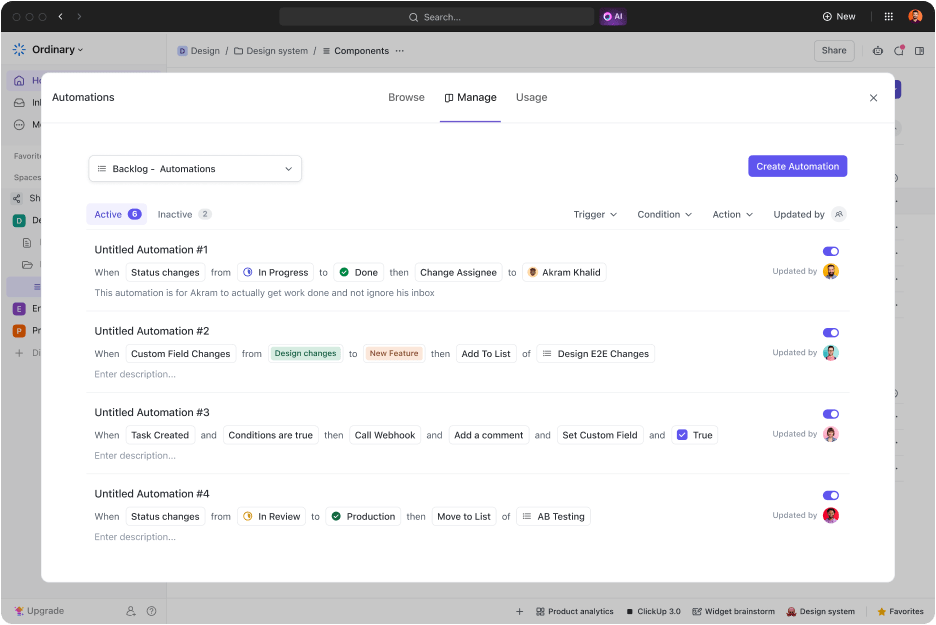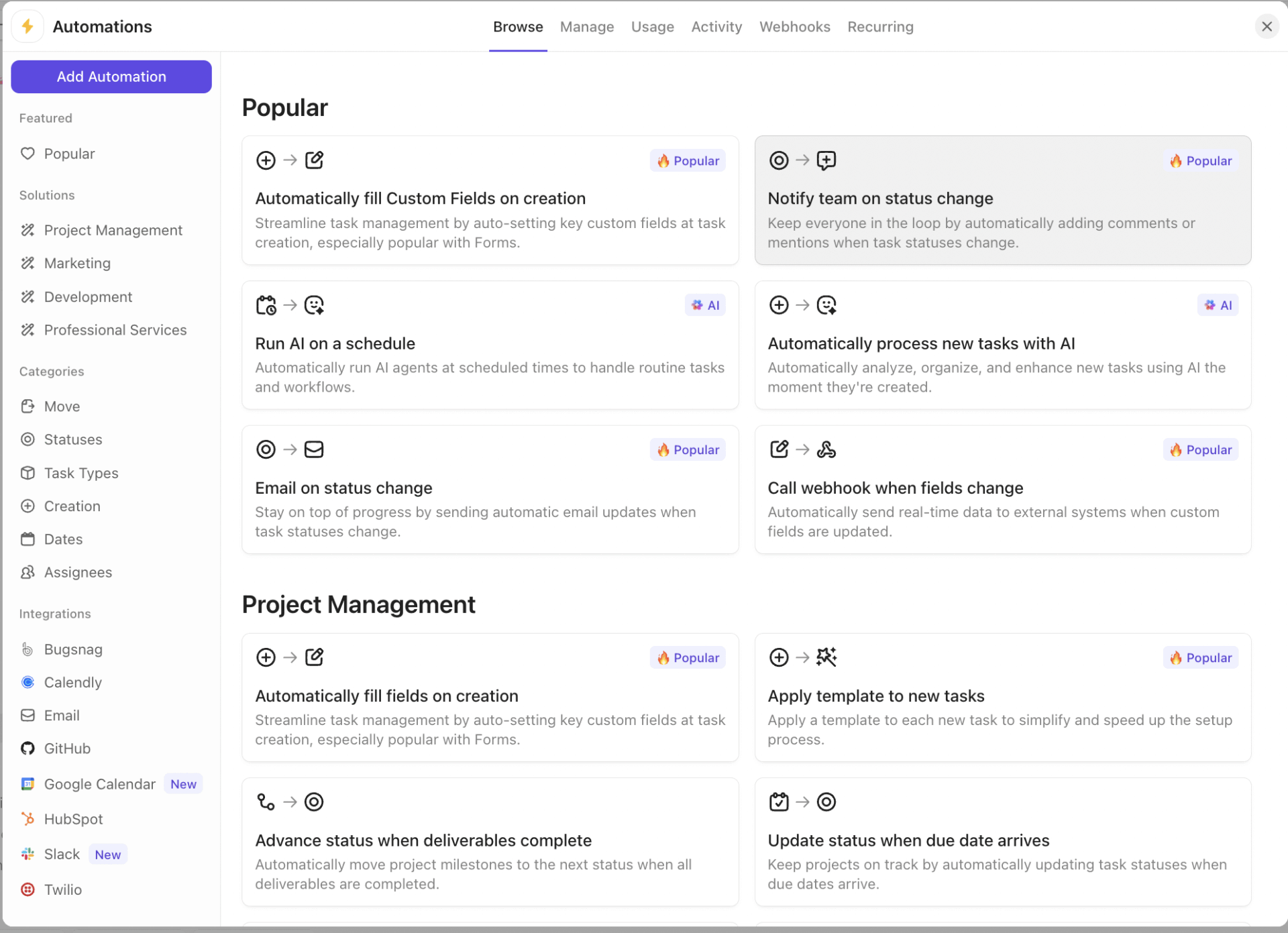Bazı araçlar hemen işe yarar. Diğerleri ise, en uygun araç olmadıklarını anlamanız için deneme ve hata sürecinden geçmeniz gerekir.
Fibery takımınız için iş yapmıyorsa (belki çok karmaşık, anahtar özellik eksik veya tam olarak uygun değilse), muhtemelen daha iyi bir alternatif arıyorsunuzdur.
İyi haber mi? İhtiyacınız olan esnekliği ve sonuçları sunan, sizi hayal kırıklığına uğratmayacak Fibery alternatifleri bolca var.
En iyi seçeneklere bir göz atalım. 👇
Fibery nedir?
Fibery, görevleri, belgeleri, veritabanlarını ve beyaz tahtaları tek bir çalışma alanına entegre eden bir iş yönetimi platformudur.
Süreç tasarımı ve bilgi yönetiminde mükemmeldir ve uyarlanabilirlik gerektiren ortamlar için tasarlanmıştır. Bu araç, ş Akışı esnekliğini korurken işbirliğini kolaylaştırmak isteyen takımlar için idealdir.
Ayrıca, platformun esnek bağlantı sistemi, kullanıcıların görevleri notlara veya veritabanlarına, belgelere senkronizasyon etmelerine olanak tanıyarak daha yapılandırılmış bir çalışma alanı oluşturur.
Fibery Sınırları
Fibery harika bir proje yönetimi aracı olsa da, her türlü ş akışına uygun olmayabilir. Kullanıcıları Fibery alternatifleri aramaya iten yaygın sınırlar şunlardır:
- Mobil erişilebilirlik: Masaüstü veya dizüstü bilgisayarlarından uzaktayken görevlere erişmesi, bunları düzenleme veya yönetmesi gereken kullanıcıları sınırlar.
- Raporlama sınırlamaları: Takımların projeler genelinde performansı izleme yeteneğine yardımcı olan özel gösterge panelleri, ayrıntılı filtreler veya görsel analizler gibi gelişmiş raporlama araçları bulunmamaktadır.
- Ölçeklenebilir arayüz: Çeşitli departmanlar veya girişimler arasında birden fazla görev, veritabanı ve bağlantılı öğeleri yönetirken gezinmek zorlaşır.
- Oryantasyon çabası: Yeni takım üyelerinin fonksiyonunu anlamasına yardımcı olmak için zaman ve iç dokümantasyon gerektirir.
- İşbirliği araçları: Yalnızca temel yorum fonksiyonu içerir ve platform içinde gerçek zamanlı tartışma veya merkezi takım iletişimini desteklemez.
- Otomasyon derinliği: Yalnızca birkaç yerel otomasyon seçeneğini sağlar ve gelişmiş tetikleyiciler, koşullar ve çok adımlı ş Akışı içermez.
🔍 Biliyor muydunuz? 13.000 milden fazla uzunluğa sahip Çin Seddi, yüzyıllar süren bir süreçte tamamlandı ve muazzam kaynakların ve iş gücünün koordinasyonunu gerektirmiştir. Lojistik zorluklar, uzun bir zaman çizelgesinde ilerlemeyi sürdürmek için sofistike proje yönetimi becerileri gerektirmiştir.
11 Fibery Alternatiflerine Genel Bakış
Detaylara girmeden önce, en iyi Fibery alternatiflerine ve takımları güçlendirmek için güçlü yönlerine hızlıca bir göz atalım. 📊
| Araç | En uygun | Anahtar özellikler | Fiyatlandırma* |
| ClickUp | Yapay zeka proje ve görev yönetimi arayan her boyutlu takımlar | Özel otomasyonlar; Entegre AI ve AI Ajanları; Yerleşik zaman takibi ve raporlama; 1.000'den fazla uygulama bağlantısı; Merkezi dokümantasyon ve bilgi yönetimi; Çoklu Görünümler | Sonsuza Kadar Ücretsiz; Kurumsal için özel özelleştirme seçenekleri mevcuttur |
| Coda | Esnek dokümantasyon ve ş Akışlarına ihtiyaç duyan küçük ve orta boyutlu takımlar | Etkileşimli belgeler; not alma; ş Akışı otomasyonu; Özelleştirilebilir şablonlar | Ücretsiz; Ücretli planlar aylık 12 $'dan başlar. |
| Asana | Kolaylaştırılmış proje yönetimi ş Akışları arayan orta boyutlu şirketler | Bağımlılıklar içeren görsel proje zaman çizelgeleri; AI destekli görev özetleri ve ş Akışı bilgileri; Entegre takım iletişimi; Performans ve ilerleme raporları | Ücretsiz; Ücretli planlar aylık 13,49 $'dan başlar. |
| Notion | Esnek çalışma alanı çözümleri arayan bilgi çalışanları | Birbirine bağlı veritabanları ve wikiler; Gerçek zamanlı düzenleme özelliğine sahip ortak belgeler; İş akışı şablonları ve oryantasyon sistemleri; Merkezi bilgi tabanı | Ücretsiz; Ücretli planlar aylık 12 $'dan başlar. |
| Airtable | Hesap tablosu-veritabanı melezi ihtiyacı olan küçük ve büyük takımlar | Görsel veritabanı görünümleri; Otomasyonlu iş akışları ve proje izleme; Takımlar arası işbirliğine dayalı çalışma alanları; Esnek raporlama ve gösterge paneli | Ücretsiz; Ücretli planlar aylık 24 $'dan başlar. |
| Monday. com | Proje izleme ve işbirliği arayan orta ve büyük boyutlu takımlar | Özelleştirilebilir görev ve ş Akışı panoları; iş yükü ve dönüm noktaları için gerçek zamanlı gösterge panelleri; Verimlilik ve performans raporları | Ücretsiz; Ücretli planlar aylık 12 $'dan başlar. |
| Trello | Basit ve görsel görev yönetimi arayan serbest çalışanlar ve küçük takımlar | Butler kuralları ile otomasyon; İşbirliği panoları ve iletişim; Genişletilmiş fonksiyonellik için güçlendiriciler; Görsel proje izleme | Ücretsiz; Ücretli planlar aylık 6 $'dan başlar. |
| Jira | Karmaşık projeleri izleme görevini üstlenen yazılım geliştirme takımları | Sprint planlaması ve Agile ş Akışı; Sorun ve hata izleme; Gelişmiş raporlama | Ücretsiz; Ücretli planlar aylık 7,53 $'dan başlar. |
| Basecamp | Bütünsel proje iletişimi arayan küçük takımlar | Merkezi iletişim; Projeye özel mesaj panoları; Basitleştirilmiş belge ve görev yönetimi | Ücretsiz; Ücretli planlar aylık 15 $'dan başlar. |
| Wrike | Kapsamlı iş yönetimine ihtiyaç duyan kurumsal işletmeler | Kaynak tahsisi ve iş yükü yönetimi; Gelişmiş raporlama; Yeniden kullanılabilir şablonlar | Ücretsiz; Ücretli planlar aylık 10 $'dan başlar. |
| Miro | İşbirliğine dayalı dijital beyaz tahtalara ihtiyaç duyan görsel takımlar | Sonsuz işbirliği ortamı; Etkileşimli beyin fırtınası panoları; ş Akışı diyagramları ve harita araçları; Şablon kütüphanesi | Ücretsiz; Ücretli planlar aylık 8 $'dan başlar. |
İş Yönetimi için Fibery'e En İyi Alternatifler
ş Akışınızın sorunsuz bir şekilde devam etmesini sağlamak için en iyi Fibery alternatiflerine bir göz atalım. 🔄
ClickUp'ta yazılımları nasıl değerlendiriyoruz
Editör takımımız şeffaf, araştırma destekli ve satıcıdan bağımsız bir süreç izler, bu nedenle önerilerimizin gerçek ürün değerine dayandığından emin olabilirsiniz.
ClickUp'ta yazılımları nasıl incelediğimize dair ayrıntılı bir özet aşağıda yer almaktadır.
ClickUp (Hepsi bir arada proje ve görev yönetimi için en iyisi)
Fibery büyüklüğü çok yapılandırılmamış veya karmaşık geliyorsa, ClickUp esnekliği feda etmeden görevleri yönetmek, iş akışlarını otomasyonla yönetmek ve ilerlemeyi izlemek için daha sezgisel bir yol sağlar.
Proje yönetimi, bilgi yönetimi ve sohbeti bir araya getiren iş için her şeyi içeren uygulama, daha hızlı ve akıllı çalışmanıza yardımcı olan yapay zeka ile desteklenmektedir.
Nasıl yapıldığını inceleyelim:
İşlerinizi otomatikleştirin ve hızlandırın
Takımların karşılaştığı en büyük zorluklardan biri, zaman alan tekrarlayan görevleri yerine getirmektir.
ClickUp Otomasyon, belirli koşullar doğrultusunda eylemleri otomatik olarak tetikleyici olarak bu sorunu çözer. Durumlar değiştiğinde görevleri atar, son tarihler yaklaştığında bildirimde bulunur ve manuel müdahaleye gerek kalmadan süreçlerin sorunsuz bir şekilde çalışmasını sağlar.
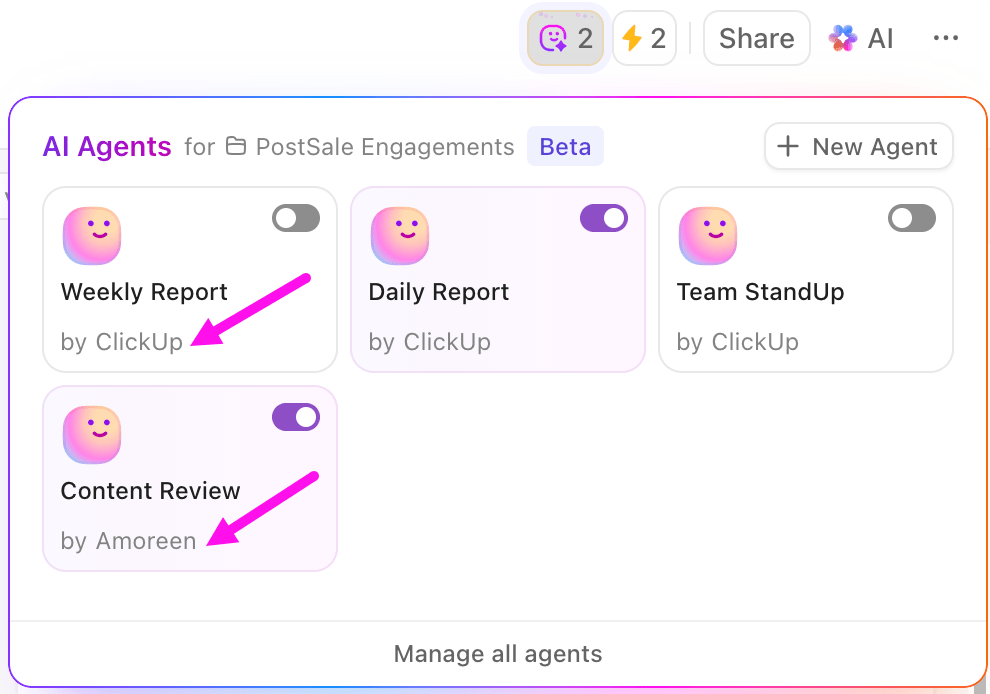
Ayrıca ClickUp'ın Otomatik Pilot Ajanlarını da kullanabilirsiniz. Bu yapay zeka destekli yardımcılar, aşağıdakiler dahil olmak üzere çeşitli tekrarlayan eylemleri özerk bir şekilde gerçekleştirir:
- Önceden tanımlanmış kriterlerinize göre görevleri atama
- Görev durumlarını otomatik olarak güncelleme
- Sohbet kanallarınızda tekrarlanan soruları yanıtlama
AI destekli proje yönetimi ile verimliliği artırın
Tüm darboğazlar görev yönetiminden kaynaklanmaz. Raporlar ve diğer içerikler yazmak, güncellemeleri özetlemek ve verileri analiz etmek, yüksek etkili işlere harcanabilecek saatleri alır.
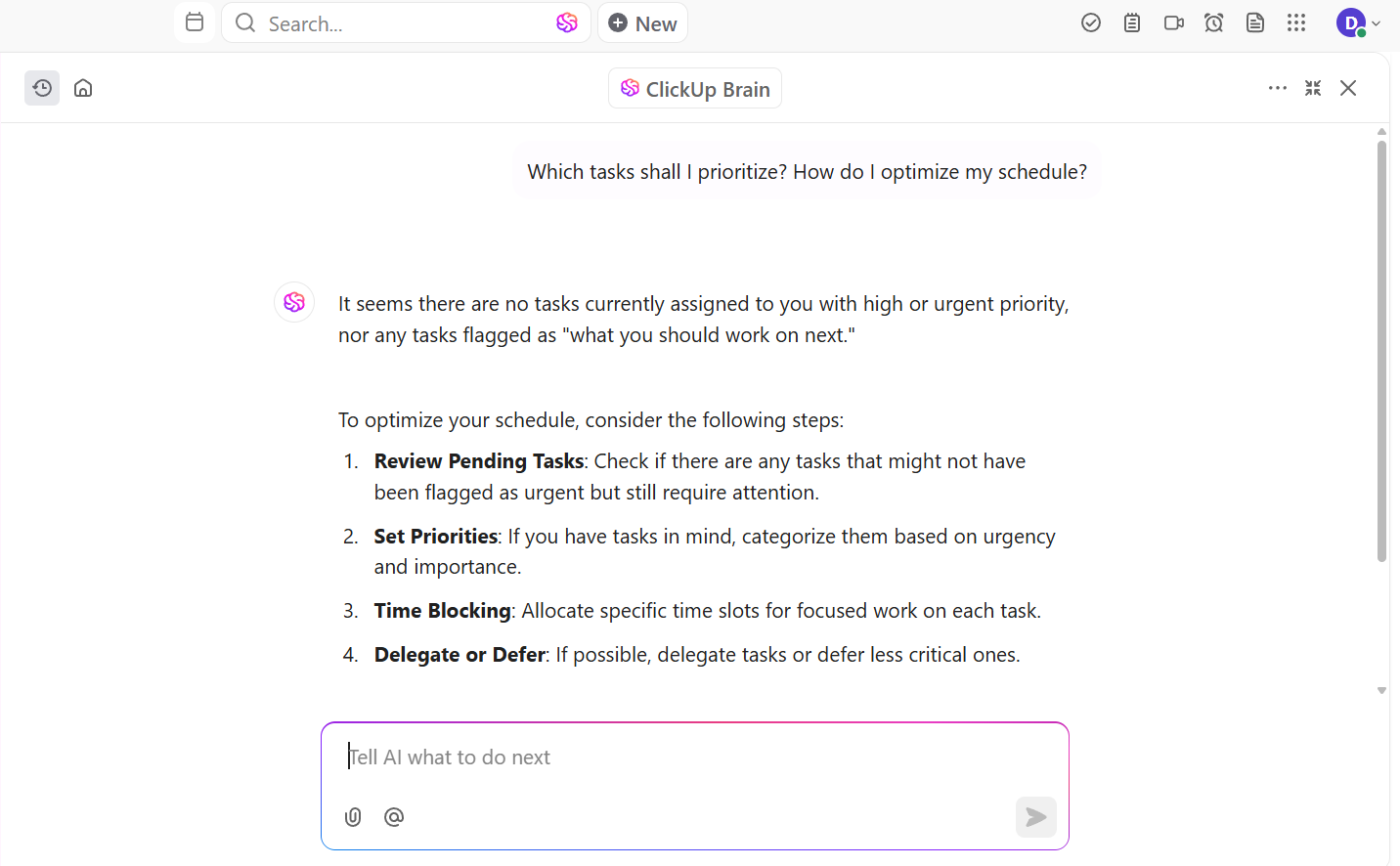
Platformun AI asistanı ClickUp Brain, bu görevleri hızlandırır. Çalışanlarınızı, projelerinizi, belgelerinizi ve uygulamalarınızı tek bir akıllı çalışma alanına bağlama yeteneği ile üretkenliğinizi artıran hepsi bir arada AI'dır. Bu sayede şunları yapabilirsiniz:
- Çalışma Alanınızın bilgi bankasından anında yanıtlar alın
- Otomatik raporlar, tablolardan oluşan standup'lar oluşturun
- Belgeleri ve e-postaları saniyeler içinde taslak haline getirin ve düzenleme
- Takımınızın sohbetleri ve görevleri hakkında akıllı özetler alın
Akıllı masaüstü AI yardımcınız ClickUp Brain MAX, daha derin içgörüler, daha akıllı otomasyon ve daha da güçlü proje yönetimi için gelişmiş AI yeteneklerini ortaya çıkarır.
- Uygulamalar arasında geçiş yapmadan en yeni AI modelleriyle sohbet edin
- Talk-to-Text ile sesinizi 50'den fazla dilde metne dönüştürün, bağlam farkında @bahsetme ve bağlantılar dahil
- Takviminizi güncellemek, görevleri atamak, mesajlar göndermek, belgeler hazırlamak ve daha fazlasını yapmak için doğal bir şekilde konuşun
Hedeflerinizi ve görevlerinizi takip edin
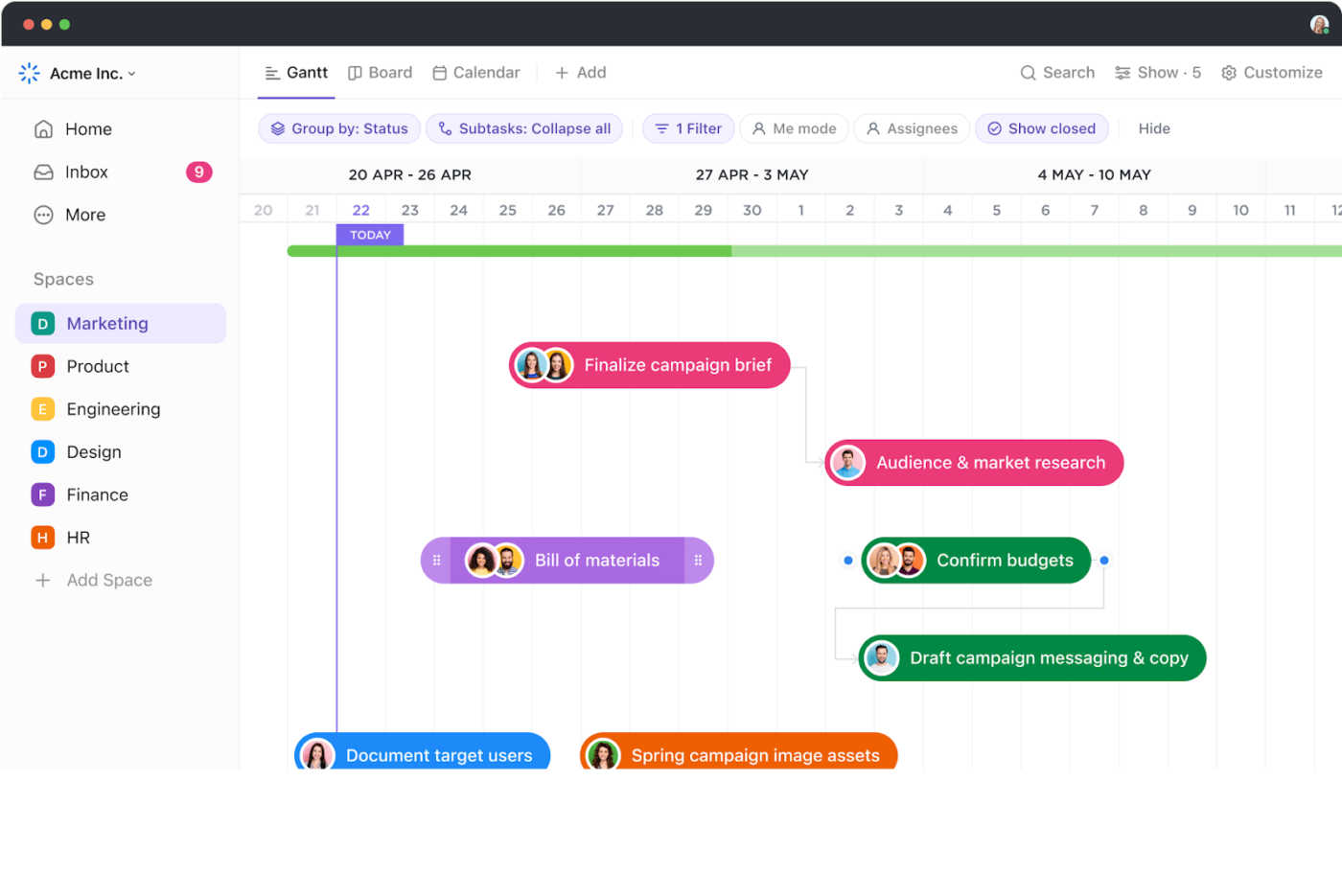
Proje planlarını izleme, günlük görevleri yönetmek kadar önemlidir. ClickUp Gantt Charts, projelerin net bir görsel zaman çizelgesini sunarak görev bağımlılıklarını ve son teslim tarihlerini tek bir yerde gösterir. Bir aşamadaki gecikme, bağımlı görevleri otomatik olarak değiştirerek son dakika kaosunu önler.
Fibery, zaman çizelgelerini yapılandırmak için daha fazla manuel çaba gerektirirken, ClickUp'ın etkileşimli Gantt görünümü yeniden planlamayı kolaylaştırır.
Günlük görev izlemesinin ötesinde, takımlar daha büyük hedeflere yönelik ilerlemeyi ölçmek için bir yönteme de ihtiyaç duyar. ClickUp Goals, üst düzey hedefleri uygulanabilir adımlara bölerek her şeyin uyumlu olmasını sağlar.
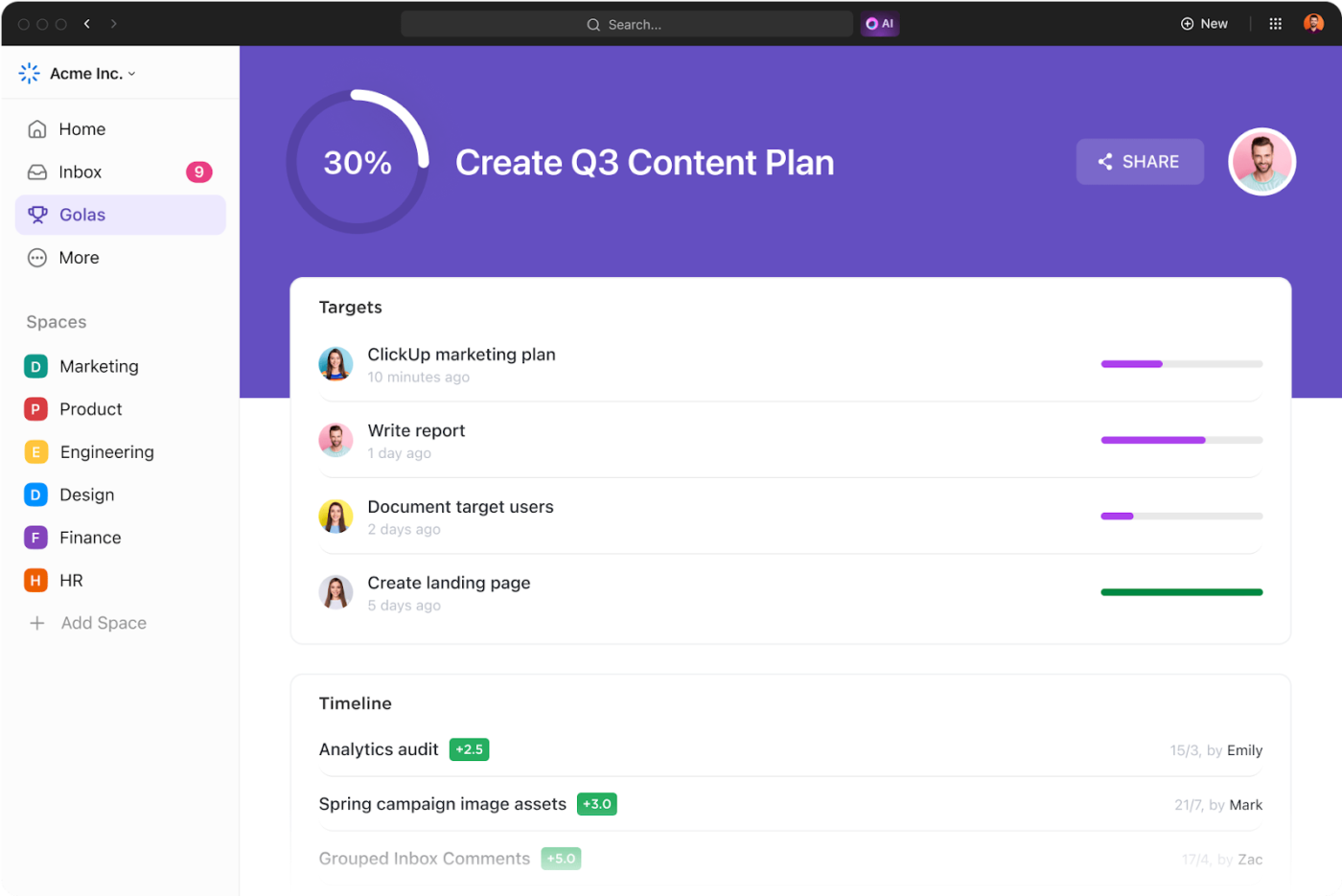
Bireysel görevler, anlaşmalar ve dönüm noktaları doğrudan hedefe bağlanır ve ilerleme güncellemeleri gerçek zamanlı olarak gerçekleşir. Bu, ek manuel iş gerektirmeden takım genelinde şeffaflık ve hesap verebilirlik sağlar.
*clickUp'ın en iyi özellikleri
- Özel otomasyonlar oluşturun: ClickUp Brain'i kullanarak ihtiyacınızı basitçe açıklayarak otomasyonlar oluşturun ve ş Akışı otomasyonunu daha erişilebilir hale getirin
- *i̇ş saatlerini kaydedin ve analiz edin: ClickUp Zaman Takibi'ni kullanarak görevlerdeki zamanı doğrudan takip edin, takımların verimliliği ölçmesine ve kaynakları tahsis etmesine yardımcı olun
- tamamen entegre bir çalışma alanı oluşturun: *ClickUp'ı Google Drive, Jira ve 1.000'den fazla diğer uygulama ile bağlantıya geçirerek araçlar arasında sorunsuz işbirliği sağlayın
- proje belgelerini düzenli tutun: *Toplantı notlarını, proje kılavuzlarını ve süreç belgelerini ClickUp Belge'de saklayın ve bunları doğrudan görevlere bağlayın
- *veritabanlarını verimli bir şekilde yönetin: Kolay gezinme ve özelleştirme için ClickUp Tablo Görünümü'nü kullanarak yapılandırılmış veritabanları oluşturun
- *şirket bilgilerini merkezileştirin ve düzenleyin: ClickUp Bilgi Yönetimi ile proje belgelerini, SOP'leri, toplantı notlarını ve araştırmaları tek bir yerde saklayın
*clickUp sınırları
- Zor öğrenme eğrisi
*clickUp fiyatlandırması
*clickUp puanları ve yorumları
- G2: 4,7/5 (10.500'den fazla yorum)
- Capterra: 4,6/5 (4.500'den fazla yorum)
*gerçek kullanıcılar ClickUp hakkında ne diyor?
TrustRadius'un bir incelem esinde şöyle deniyor:
Bu, verimliliğimizi kesinlikle basitleştirdi ve bunun büyük bir kısmı, ClickUp'ın sunduğu tüm farklı entegrasyonlar ve ClickApps sayesinde oldu. Hayatımızı kolaylaştıran ve elimizdeki gerçek projelere odaklanmamızı sağlayan otomasyonlar, bizim ve tüm şirket için gerçekten faydalı.
Bu, verimliliğimizi kesinlikle basitleştirdi ve bunun büyük bir kısmı, ClickUp'ın sunduğu tüm farklı entegrasyonlar ve ClickApp sayesinde oldu. Hayatımızı kolaylaştıran ve elimizdeki gerçek projelere odaklanmamızı sağlayan otomasyonlar, bizim ve tüm şirket için gerçekten faydalı.
💡 Profesyonel İpucu: İş Dağılım Yapısı ( WBS ) kullanarak projenizi daha küçük, yönetilebilir bileşenlere bölün. Bu hiyerarşik ayrıştırma, sorumlulukların atanmasına, maliyetlerin tahmin edilmesine ve ilerlemenin daha doğru bir şekilde izleme yapılmasına yardımcı olur.
2. Coda (Esnek dokümantasyon ve ş akışlarına ihtiyaç duyan takımlar için en iyisi)
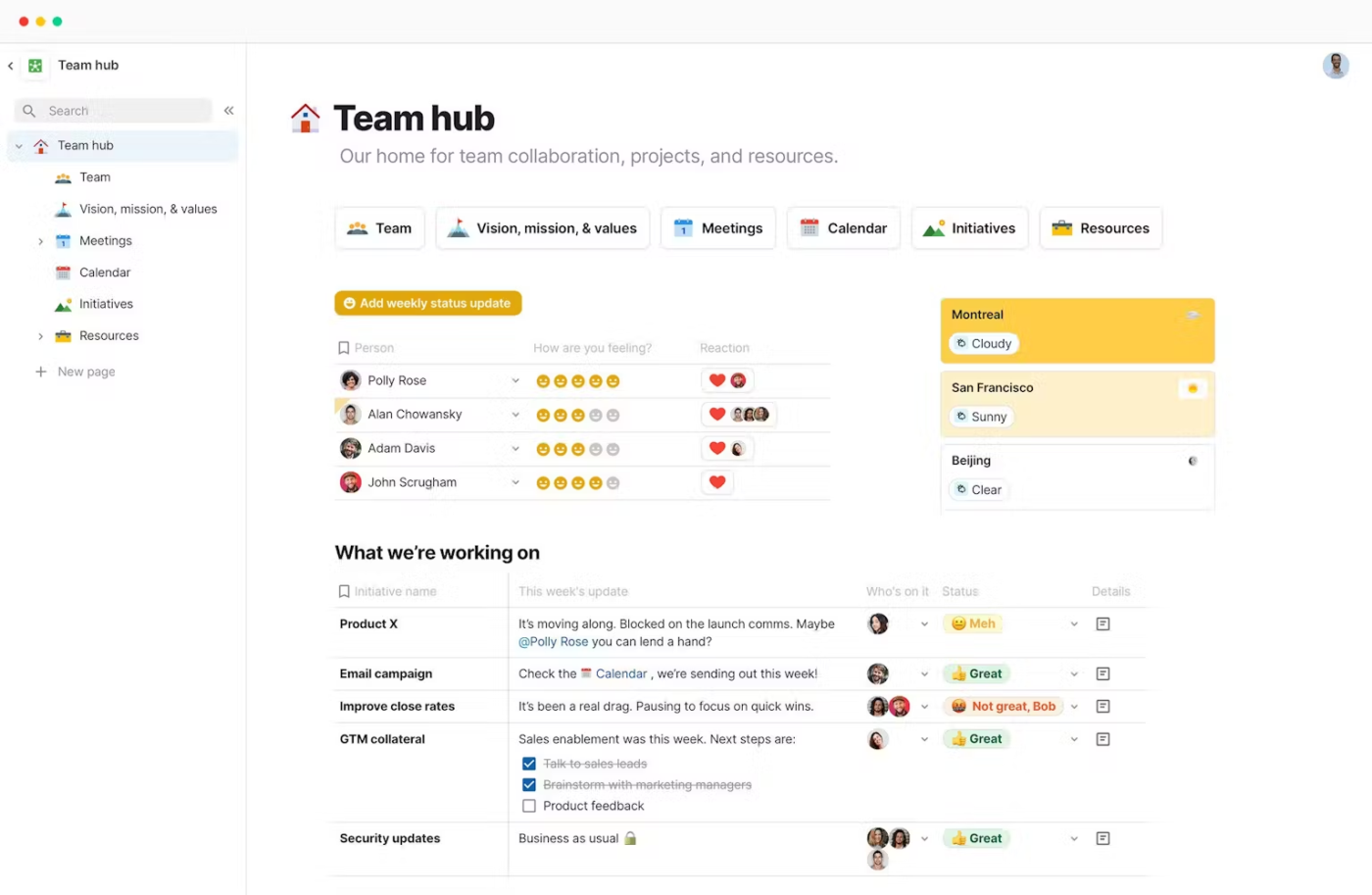
Coda, tek bir işbirliği ortamında özel ş Akışları, veritabanları ve dinamik belgeler oluşturmanıza olanak tanır. Takımınız, görevlerden veri görselleştirmeye kadar her şeyi sorunsuz bir şekilde bağlantıda tutabilir.
Coda'nın yenilikçi yaklaşımıyla, karmaşık proje yönetimi gezinmek artık çok kolay. Platform, teknik bilgiye sahip olmayan kullanıcıların kapsamlı kod bilgisi olmadan çözümler tasarlamasına olanak tanıyarak, işlevler arası işbirliğini dönüştürüyor.
Coda'nın en iyi özellikleri
- Verileri görsel hikayelere dönüştüren, proje ilerlemesini ve eğilimleri izleyen etkileşimli gösterge panelleri oluşturun
- Tekrarlayan ş akışlarını kolaylaştırmak ve akıllı eylemleri tetikleyici olarak kullanmak için özel otomasyon düğmeleri oluşturun
- Çeşitli proje türlerine uyum sağlayan ve benzersiz iş süreçlerini yakalayan kişiselleştirilmiş şablonlar tasarlayın
- Birçok veri kaynağını tek bir işbirliğine dayalı çalışma alanına entegre ederek bilgi silolarını ortadan kaldırın
- Coda AI kullanarak e-postalar yazın, tablolara oluşturun veya fikirler üretin
Coda sınırları
- API aracılığıyla Coda'yı diğer uygulamalarla entegrasyonlar gerçekleştiren kullanıcılar sorunlarla karşılaşmıştır
- Gelişmiş istatistiksel analiz için yerleşik araçlar eksiktir
Coda fiyatlandırması
- Ücretsiz
- Pro: Belge Maker başına aylık 12 $
- Takım: Doc Maker başına aylık 36 $
- Kurumsal: Özel fiyatlandırma
Coda puanları ve yorumları
- G2: 4,7/5 (460+ yorum)
- Capterra: 4,6/5 (95+ yorum)
*gerçek kullanıcılar Coda hakkında ne diyor?
G2 incelemesinden alıntı:
Şimdiye kadar ihtiyacımız olan her şeye uygun harika sayfa oluşturmak için kolaylık ve karmaşıklık arasındaki dengeyi çok seviyorum. Google Haritalar gibi harika bağlantıları sayesinde karmaşık şeyleri çok kolay bir şekilde oluşturabilirsiniz... İstenilen düzeyde nasıl kullanılacağını anlamak için birçok Coda ipucu videosunu izlemek zorunda kaldım, bu yüzden oluşturduğum bazı belgelere entegrasyonlar yapmak zor oldu.
Şimdiye kadar ihtiyacımız olan her şeye uygun harika sayfa oluşturmak için kolaylık ve karmaşıklık arasındaki dengeyi çok seviyorum. Google Haritalar gibi harika bağlantıları sayesinde karmaşık şeyleri çok kolay bir şekilde oluşturabilirsiniz... İstenilen düzeyde nasıl kullanılacağını anlamak için birçok Coda ipucu videosunu izlemek zorunda kaldım, bu yüzden oluşturduğum bazı belgelere entegrasyon yapmak zor oldu.
📖 Ayrıca okuyun: Taskade vs. ClickUp: Proje yönetimi için hangisi daha iyi?
3. Asana (Verimli proje yönetimi ş Akışı arayan takımlar için en iyisi)
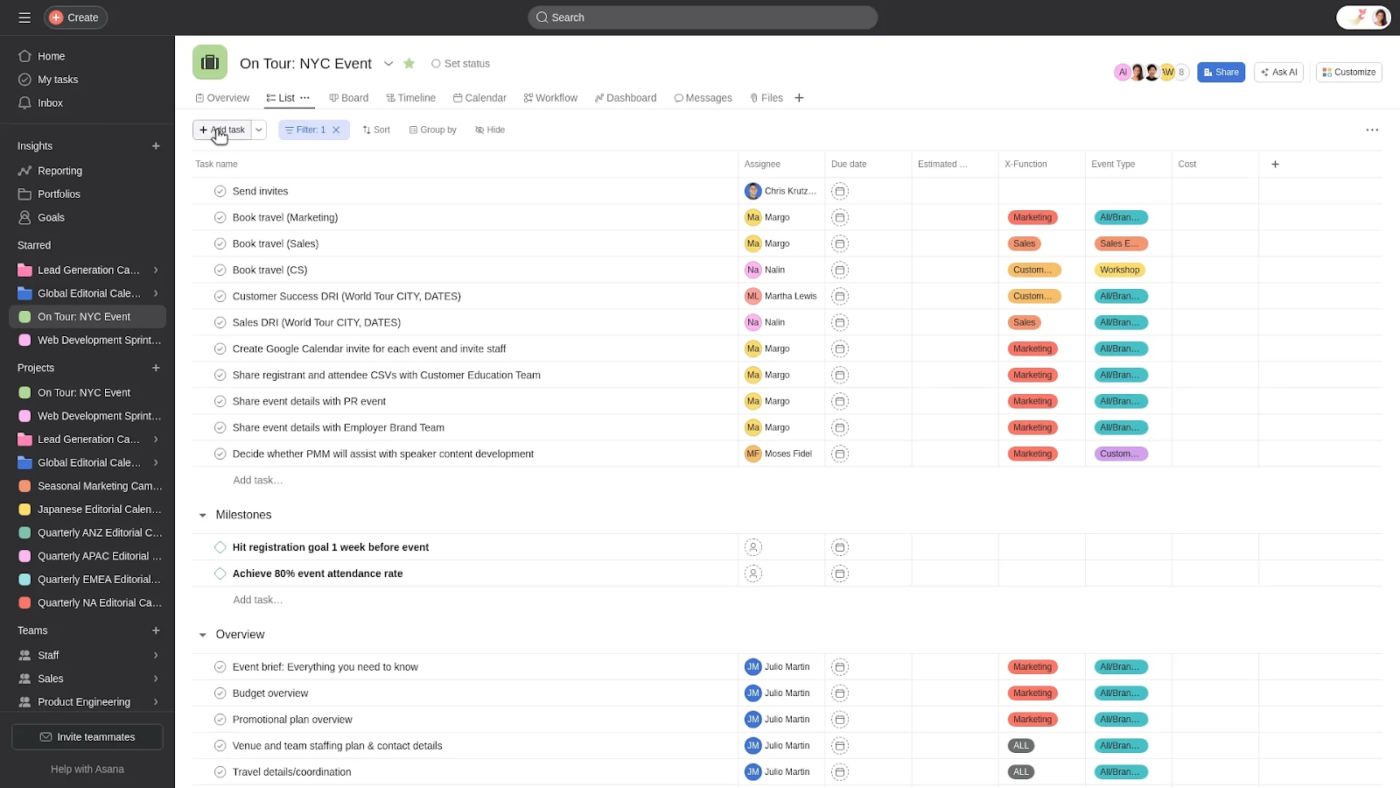
Asana, proje yönetimini basitleştirerek ve her şeyi tek bir yerde düzenli tutarak ekip çalışmasını kolaylaştırır. Görsel ve esnek platformu, her boyutlu takımın karmaşık projeleri net ve yönetilebilir görevlere ayırmasına yardımcı olurken, bağlantıyı ve ilerlemeyi izlemeyi sağlar.
Asana ile proje işbirliği sorunsuz bir şekilde gerçekleşir. Görevleri atayabilir, öncelikleri ayarlayabilir ve ilerlemeyi izleme yapabilirsiniz. Küçük bir ekibi koordine etmekten birden fazla departmanı yönetmeye kadar, takımınızın odaklanmasını ve uyumlu çalışmasını sağlar.
asana'nın en iyi özellikleri*
- Karmaşık girişimleri harita haline getiren, bağımlılıkları ve kritik yol dönüm noktalarını gösteren görsel proje zaman çizelgeleri oluşturun
- Ş Akışınızı optimize etmek için otomatik özetler ve öneriler için Asana AI kullanın
- İletişim kanallarını doğrudan proje yönetimine entegre ederek takım konuşmalarını ve bağlamı merkezileştirin
- Takım performansı ve proje ilerlemesi hakkında kapsamlı raporlar oluşturun
*asana sınırları
- Görevler yalnızca bir kişiye atanabilir, bu da işbirliği sınırlar
- Yerleşik zaman takibi özellikleri bulunmadığından, görev sürelerini izlemek için üçüncü taraf entegrasyonları gerektirir
*asana fiyatlandırması
- Kişisel: Ücretsiz
- Başlangıç: Kullanıcı başına aylık 13,49 $
- Gelişmiş: Kullanıcı başına aylık 30,49 $
- Kurumsal: Özel fiyatlandırma
- Kurumsal+: Özel fiyatlandırma
Asana puanları ve yorumları
- G2: 4,4/5 (10.000'den fazla yorum)
- Capterra: 4,5/5 (12.000'den fazla yorum)
4. Notion (Esnek çalışma alanı çözümleri arayan bilgi çalışanları için en iyisi)
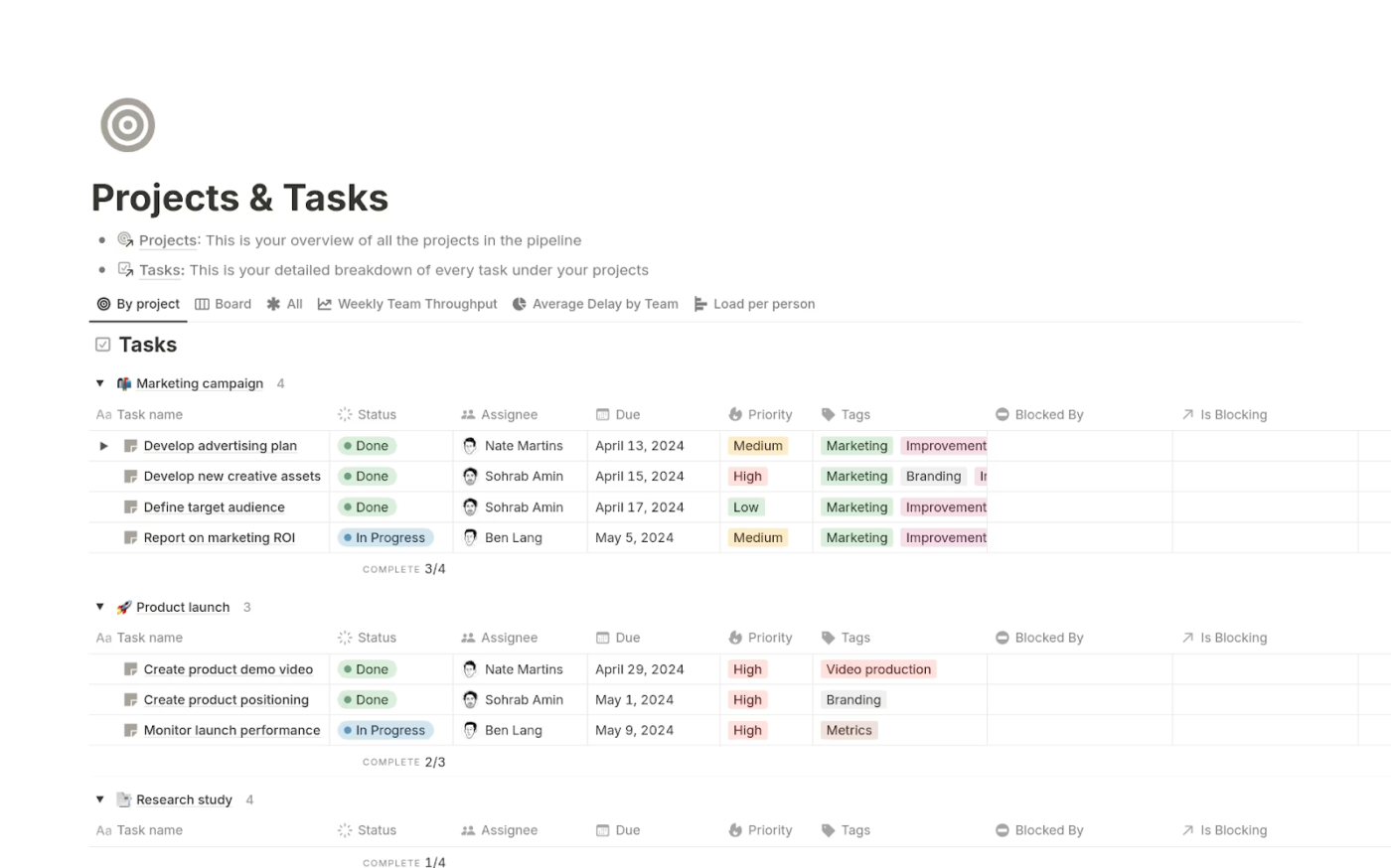
Notion proje yönetimi, esnek bir çalışma alanında dokümantasyon, proje yönetimi ve işbirliğini bir araya getirir. Ekiplerin işlerini tek bir yerde düzenleyebilecekleri, izleyebilecekleri ve bağlantıya geçirebilecekleri özelleştirilebilir bir merkezdir.
Bilgi, projeler arasında sorunsuz bir şekilde akış gösterir, böylece silolar ortadan kalkar ve işbirliği zahmetsiz hale gelir. Ayrıca, Notion AI 'yı kullanarak toplantı notlarını özetleyebilir, proje teklifleri taslağı hazırlayabilir, bir metin bloğundan eylem öğelerini çıkarabilir veya bir proje veritabanındaki özellikleri otomatik olarak doldurabilirsiniz.
Notion'un en iyi özellikleri
- Birden fazla proje boyutunda bilgileri birbirine bağlayan, birbirine bağlı veritabanları oluşturun.
- Kurumsal öğrenmeyi merkezileştiren özel wiki'ler ve bilgi tabanları tasarlayın.
- ş Akışlarını ve işe alım süreçlerini standartlaştıran gelişmiş şablonlar oluşturun.
- AI ile proje özetleri, durum güncellemeleri veya iletişim duyuruları taslakları hazırlayın.
- Gerçek zamanlı düzenleme ve kapsamlı sürüm kontrolü ile işbirliğine dayalı belgeler geliştirin.
Notion sınırları
- Uzantılı veritabanlarını yönetmek, sistemin yavaşlamasına neden olarak kullanıcı deneyimini ve verimliliği etkileyebilir.
- Notion, bazı Notion alternatiflerinin aksine, özel hedef ayar özelliklerinden yoksundur.
- AI yalnızca İş ve Enterprise Planı'na dahildir.
Notion fiyatlandırması
- Ücretsiz
- Artı: Kullanıcı başına aylık 12 $
- İş: Kullanıcı başına aylık 24 $
- Kurumsal: Özel fiyatlandırma
Notion puanları ve yorumları
- G2: 4,7/5 (2.495+ yorum)
- Capterra: 4,7/5 (2.500'den fazla yorum)
📮 ClickUp Insight: Anket katılımcılarının %35'i Monday günü en az verimli gün olarak belirtirken, %50'si cuma günü en verimli gün olarak belirtmiştir.
Akıllı planlamadan yapay zeka destekli görev yönetimine kadar ClickUp'ın verimlilik araçlarıyla, halsiz Monday günlerini yüksek verimli iş günlerine dönüştürün. Haftanızı planlayın, anahtar görevlere öncelik verin ve zahmetsizce yolunuzdan sapmayın.
5. Airtable (Güçlü elektronik tablo-veritabanı hibrit çözümlerine ihtiyaç duyan takımlar için en iyisi)
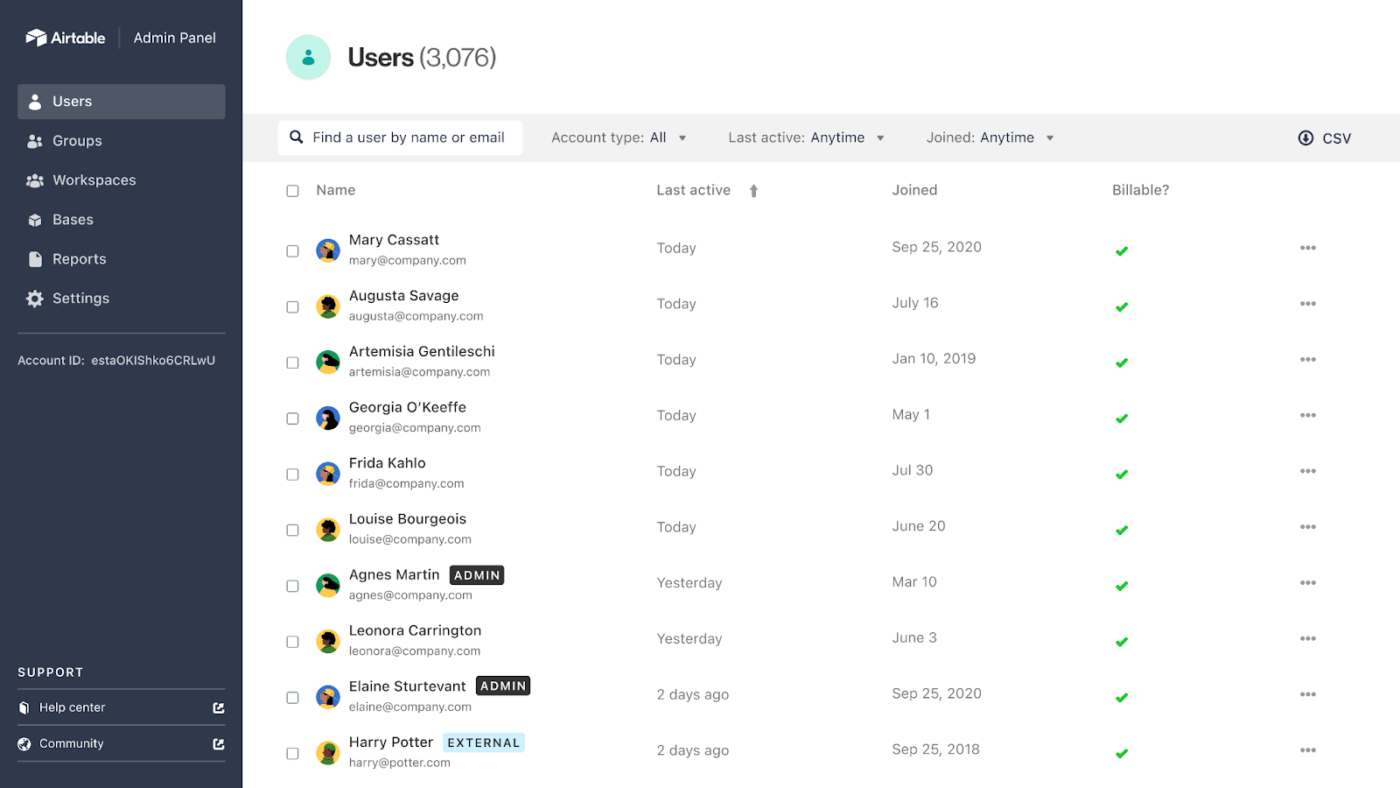
Airtable, elektronik tabloların tanıdık yapısını veritabanının gücüyle birleştirerek veri yönetimini kolaylaştırır. Takımların dağınık elektronik tablolar veya katı sistemlerde kaybolmadan organize olmalarına, izleme yapmalarına ve işbirliği yapmalarına yardımcı olan esnek bir araçtır.
Özelleştirilebilir görünümler, yapay zeka desteği ve kullanımı kolay arayüzü ile Airtable, karmaşık verileri net ve eyleme geçirilebilir içgörülere dönüştürmenizi sağlar.
Projeleri yönetiyor, envanteri izleme veya içerik planlıyor olun, ş Akışınıza uyum sağlayarak size ihtiyaç duyduğunuz yapıyı baş ağrıtmadan sunar.
Airtable'ın en iyi özellikleri
- Ham verileri eyleme geçirilebilir içgörülere dönüştüren görsel veritabanı görünümleri oluşturun.
- Özelleştirilebilir iş akışı otomasyonlarıyla tekrarlayan görevleri otomatikleştirin ve gerçek zamanlı proje izleme için etkileşimli gösterge panelleri oluşturun.
- Airtable'ın AI Ajanları ile belgeleri analiz edin, web'de arama yapın ve daha fazlasını gerçekleştirin.
- Birden fazla platformda bilgilerin senkronizasyonunu sağlayan işbirliğine dayalı çalışma alanları geliştirin.
- Çeşitli iş ihtiyaçlarına uyarlanabilen esnek raporlama mekanizmaları oluşturun.
Airtable sınırları
- Derinlemesine analizler ve özelleştirilebilir raporlar olmadan sınırlı raporlama yetenekleri
- Premium planlarda bile kayıtlar, otomasyon işlemleri ve depolama alanına sınırlar getirir, bu da orta ve büyük boyutlu takımlar için kısıtlayıcı olabilir.
Airtable fiyatlandırması
- Ücretsiz (iki kullanıcıyla sınırlı)
- Takım: Kullanıcı başına aylık 24 $
- İş: Kullanıcı başına aylık 54 $
- Kurumsal: Özel fiyatlandırma
Airtable puanları ve yorumları
- G2: 4,6/5 (2.770+ yorum)
- Capterra: 4,7/5 (2.155+ yorum)
Gerçek kullanıcılar Airtable hakkında ne diyor?
Capterra incelemesine göre:
Airtable'ı çoğu projemde veritabanı olarak kullandım. Küçük projeler için gerçekten kullanışlı ve ücretsiz sürümü çok cömert. Airtable'ın önceki sürümlerinde hücrelerde varlıkları (resimler vb.) barındırabiliyordunuz ve Airtable bunlar için kalıcı bir URL sağlayıcısıydı. Görünüşe göre bu özellik artık yok ve onu gerçekten özlüyorum.
Airtable'ı çoğu projemde veritabanı olarak kullandım. Küçük projeler için gerçekten kullanışlı ve ücretsiz sürümü çok cömert. Airtable'ın önceki sürümlerinde hücrelerde varlıkları (resimler vb.) barındırabiliyordunuz ve Airtable bunlar için kalıcı bir URL sağlayıcısıydı. Görünüşe göre bu özellik artık yok ve onu gerçekten özlüyorum.
🤝 Dostça Hatırlatıcı: Projenin başlangıcından tamamlanmasına kadar riskleri proaktif olarak belirleyin, değerlendirin ve azaltın. Kapsamlı bir risk yönetimi planı geliştirmek, olası sorunları önceden tahmin etmeye ve bunları çözmek için stratejiler uygulamaya yardımcı olarak projenin daha sorunsuz yürütülmesini sağlar.
6. Monday. com (Kapsamlı ş Akışı yönetimi gerektiren takımlar için en iyisi)
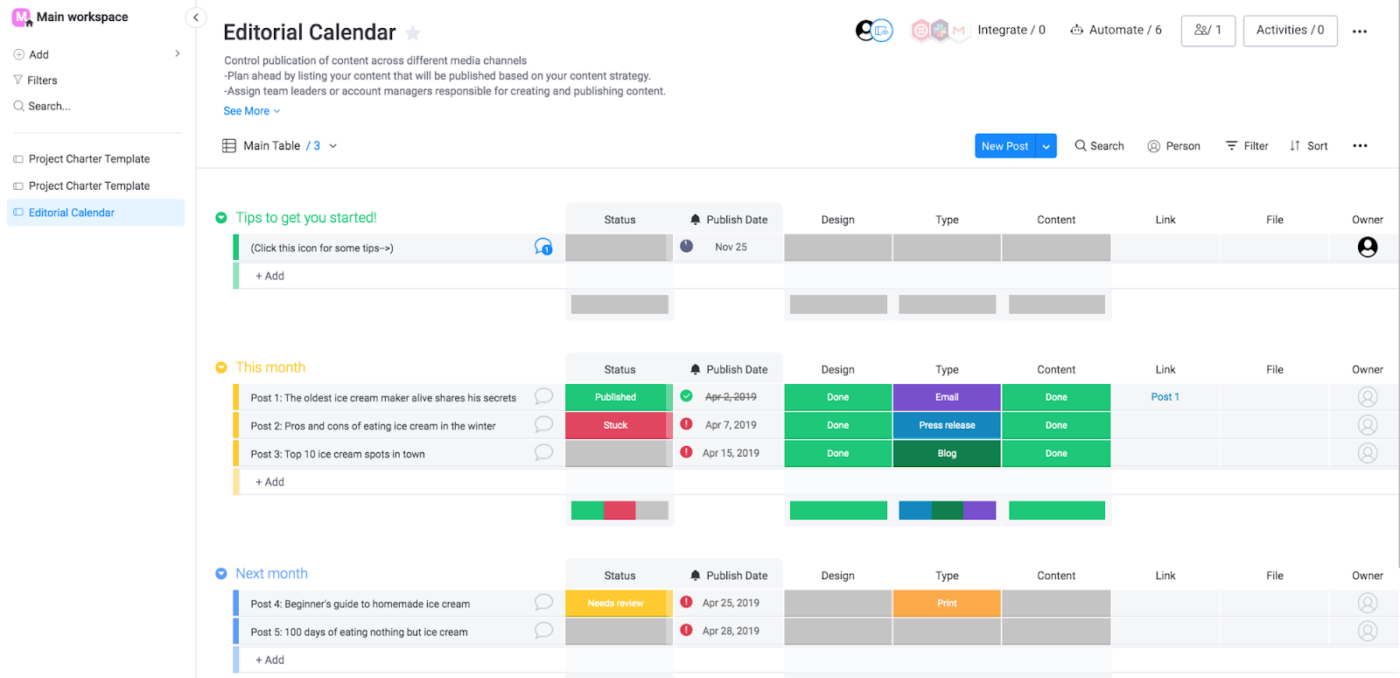
Monday.com, projeleri canlı, renk kodlu bir deneyime dönüştüren ve iş izlemesini sezgisel ve ilgi çekici hale getiren bir görev yönetimi yazılımıdır. Kullanıcılar, ekibinin operasyonel yapısının her yönünü temsil eden özel panolar oluşturabilir.
Renkli arayüzler ve sürükle ve bırak fonksiyonu, karmaşık proje koordinasyonunu şaşırtıcı derecede basit hale getirir. Takımlar, tüm ş Akışı ekosistemini benzeri görülmemiş bir netlik ve hassasiyetle görselleştirebilir.
Kullanıcılar, durum değiştiğinde bildirim gönderme, yeni öğeler oluşturma veya görevleri panolar arasında taşıma gibi rutin görevleri otomatikleştirmek için "tarifler" ayarlayabilirler.
Monday.com'un en iyi özellikleri
- Karmaşık ş akışlarını takip etmeyi kolaylaştıracak şekilde görevleri, son teslim tarihlerini ve bağımlılıkları düzenleyin.
- Kod gerektirmeyen gösterge panelleriyle proje ilerlemesi, takım iş yükü ve anahtar dönüm noktaları hakkında gerçek zamanlı güncellemeler alın.
- Takım verimliliğini net bir şekilde sağlayan raporlar oluşturarak ş akışlarını optimize etmenize ve hedeflerinize daha hızlı ulaşmanıza yardımcı olun.
- Kanban, Gantt ve takvim gibi birden fazla görünüm kullanarak proje verilerini görselleştirin.
Monday.com sınırları
- Farklı kullanıcı demografileri için sınırlı yönetim kurulu ayarları özel
- Bazı kullanıcılar, görevlere ilişkin zaman ve giderleri izlemeyi zor buluyor.
Monday.com fiyatlandırması
- Ücretsiz (iki kullanıcıyla sınırlı)
- Temel: Kullanıcı başına aylık 12 $
- Standart: Kullanıcı başına aylık 14 $
- Pro: Kullanıcı başına aylık 24 $
- Kurumsal: Özel fiyatlandırma
Monday.com puanları ve yorumları
- G2: 4,7/5 (12.870+ yorum)
- Capterra: 4,6/5 (5.385+ yorum)
📖 Ayrıca okuyun: ClickUp ve Monday: Hangi takım yönetimi aracı en iyisi?
7. Trello (Basit ve görsel görev yönetimi arayan takımlar için en iyisi)
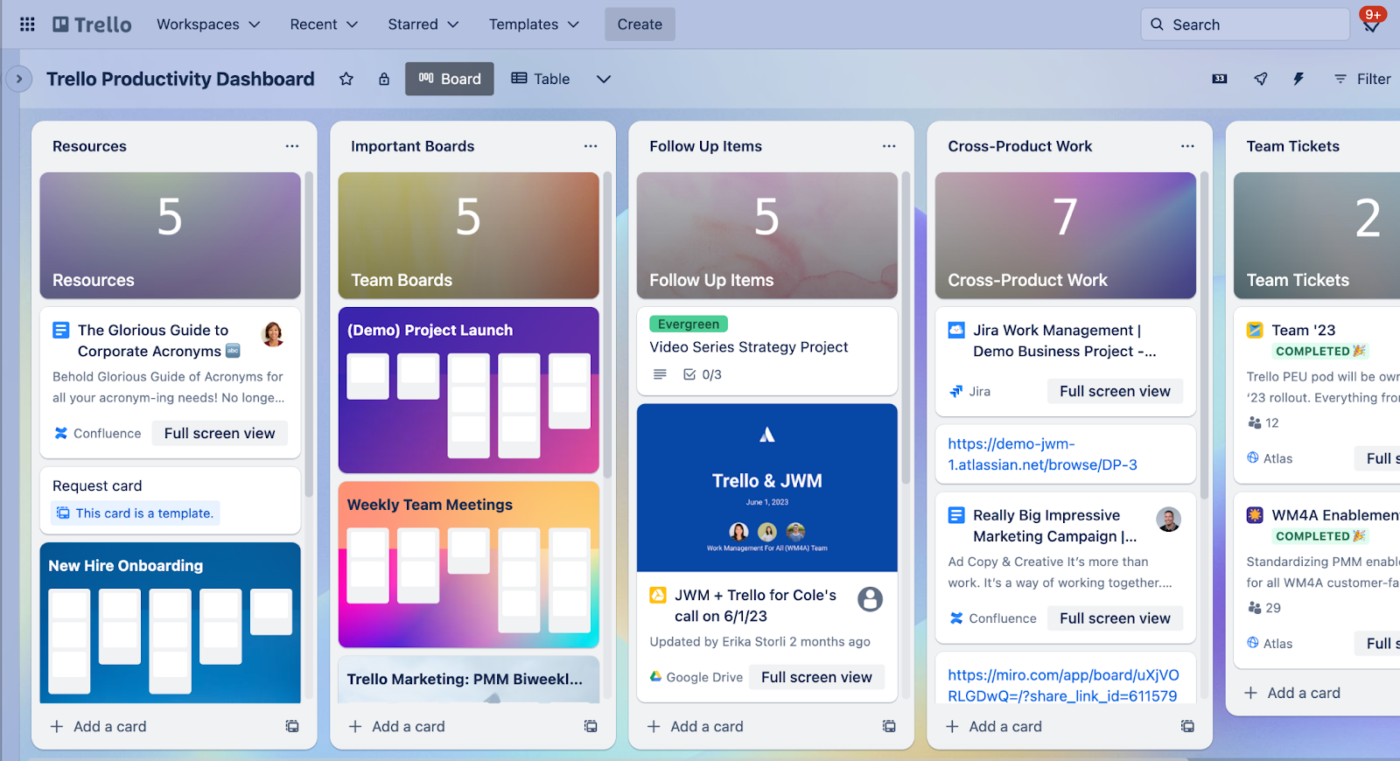
Trello, sezgisel kart tabanlı sistemi ile proje organizasyonunu kolaylaştırır ve karmaşık ş akışlarını net, görsel panolara dönüştürür. Geleneksel AI proje yönetimi araçlarının aksine, Trello'nun sürükle ve bırak arayüzü, görev izlemeyi doğal hale getirir — zorlu bir öğrenme süreci yoktur, sadece sorunsuz, organize bir ilerleme vardır.
Esnek yapısı, takımların projeleri yönetilebilir, taşınabilir bileşenlere ayırmasına olanak tanıyarak hiçbir şeyin karışıklıkta kaybolmamasını sağlar. Herkesi gerçek zamanlı olarak uyumlu hale getiren etkileşimli panolarla işbirliği sorunsuz bir şekilde gerçekleşir.
Trello'nun en iyi özellikleri
- Butler kullanarak özel otomasyon kuralları geliştirin ve manuel görev yönetimini azaltın.
- Görev kartlarına doğrudan yorumlar, dosyalar ve @bahsetmeler ekleyerek takım üyeleriyle işbirliği yapın.
- Platformun fonksiyonunu temel görev izlemesinin ötesine taşıyan Güçlendiriciler oluşturun.
- Sezgisel kart arayüzleri aracılığıyla proje durumunun hızlı anlık görüntülerini oluşturun.
- Önemli tarihleri izleme için proje son tarihlerini ve zaman çizelgelerini takvim biçimi olarak görünümü sağlayın.
Trello sınırları
- Karmaşık projelerin yönetimi zorlaşabilir
- Büyük kuruluşlar için ölçeklenebilirlik sorunları ve ücretsiz planın temel entegrasyonlar
Trello fiyatlandırması
- Ücretsiz
- Standart: Kullanıcı başına aylık 6 $
- Premium: Kullanıcı başına aylık 12,50 $
- Kurumsal: Kullanıcı başına aylık 17,50 $ (yıllık faturalandırılır)
*trello puanları ve yorumları
- G2: 4,4/5 (13.670+ yorum)
- Capterra: 4,5/5 (23.435+ yorum)
🤝 Dostça Hatırlatıcı: Dinamik proje ortamlarında, Agile uygulamalarını benimsemek, değişen gereksinimlere uyum sağlama imkanı sunar. Yinelemeli döngüler halinde iş yapmak ve sürekli geri bildirim toplamak, projenin paydaşların ihtiyaçları ve piyasa koşullarına uygun olarak gelişmesini sağlar.
8. Jira (Karmaşık projeleri izleyen yazılım geliştirme takımları için en iyisi)
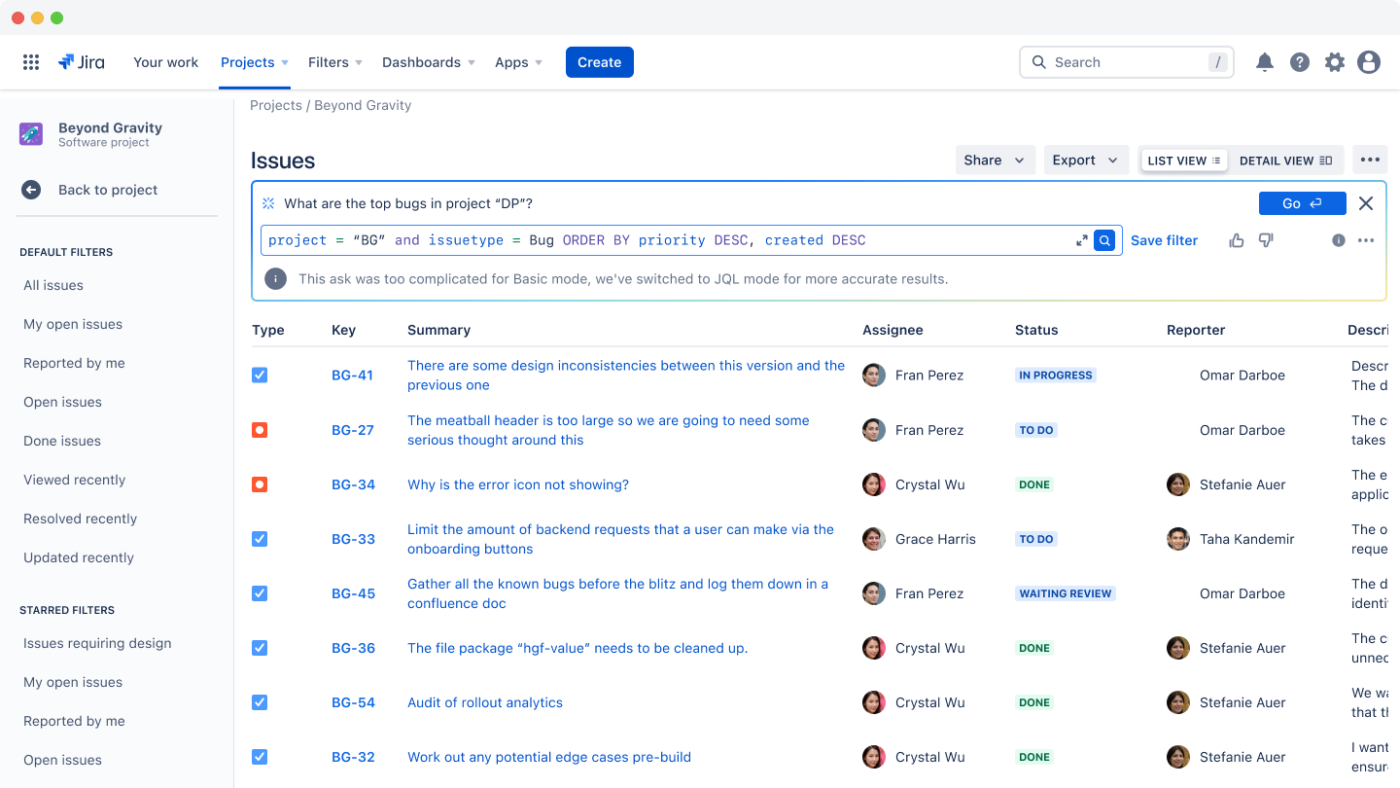
Jira, yazılım geliştirme ve Agile takımları için tasarlanmış olup, projeleri hassas ve kontrollü bir şekilde yönetmek için gerekli araçları sunar. Geliştiricilerin geliştirme sürecinin her aşamasını planlayabileceği, izleme yapabileceği ve optimize edebileceği bir çalışma alanıdır.
Teknik takımlar için Jira, karmaşık ş akışlarını daha yönetilebilir hale getirir. Sprint planlamasıから hata izlemeにまで、her şeyi düzenli ve şeffaf tutar.
Ayrıca, yerleşik Agile özellikleri sayesinde takımlar esnek kalabilir, hızlıca uyum sağlayabilir ve projelerin ilerlemesini sağlayabilir.
*jira'nın en iyi özellikleri
- Jira entegrasyonlarını kullanarak takım verimliliğini optimize eden gelişmiş sprint planlaması araçları geliştirin
- Takımınızın özel süreçlerine uyacak şekilde ş akışlarını özelleştirin
- Karmaşık proje gereksinimlerini yakalayan özel sorun izleme sistemleri tasarlayın
- Teknik proje bilgileri için ayrıntılı hata izleme ve çözüm ş Akışları oluşturun
- AI destekli özelliklerden yararlanarak sorunları özetleyin, içerik oluşturun ve akıllı öneriler alın
*jira sınırları
- Özellikle küçük takımlar için ayarı ve yapılandırması karmaşık olabilir
- Özellikle eklentiler ve entegrasyonlar da hesaba kattığınızda maliyetler artabilir
*jira fiyatlandırması
- Ücretsiz
- Standart: Kullanıcı başına aylık 8,60 $ (100 kullanıcı)
- Premium: Kullanıcı başına aylık 17 $ (100 kullanıcı)
- Kurumsal: Özel fiyatlandırma
*jira puanları ve yorumları
- G2: 4,3/5 (6.270+ yorum)
- Capterra: 4,4/5 (15.100'den fazla yorum)
*gerçek kullanıcılar Jira hakkında ne diyor?
Bir G2 yorumcusu şöyle diyor:
Teknik Destek Mühendisi olarak, Jira mühendislik takımıyla sorunlar oluşturmak ve biletlerin durumunu izlemek için çok yararlıdır. Ayrıca, ekip herhangi bir zorlukla karşılaştığında önerilerimi sağlayıcı olarak sunmamı da sağlar. Ş Akışı oluşturabilirim ve eskalasyon sürecinde ve hata takibinde çok fazla esneklik vardır.
Teknik Destek Mühendisi olarak, Jira mühendislik takımıyla sorunlar oluşturmak ve biletlerin durumunu izlemek için çok yararlıdır. Ayrıca, ekip herhangi bir zorlukla karşılaştığında önerilerimi sağlayıcı olarak sunmamı da sağlar. Ş Akışı oluşturabilirim ve eskalasyon sürecinde ve hata takibinde çok fazla esneklik vardır.
9. Basecamp (Bütünsel proje iletişimi arayan küçük takımlar için en iyisi)
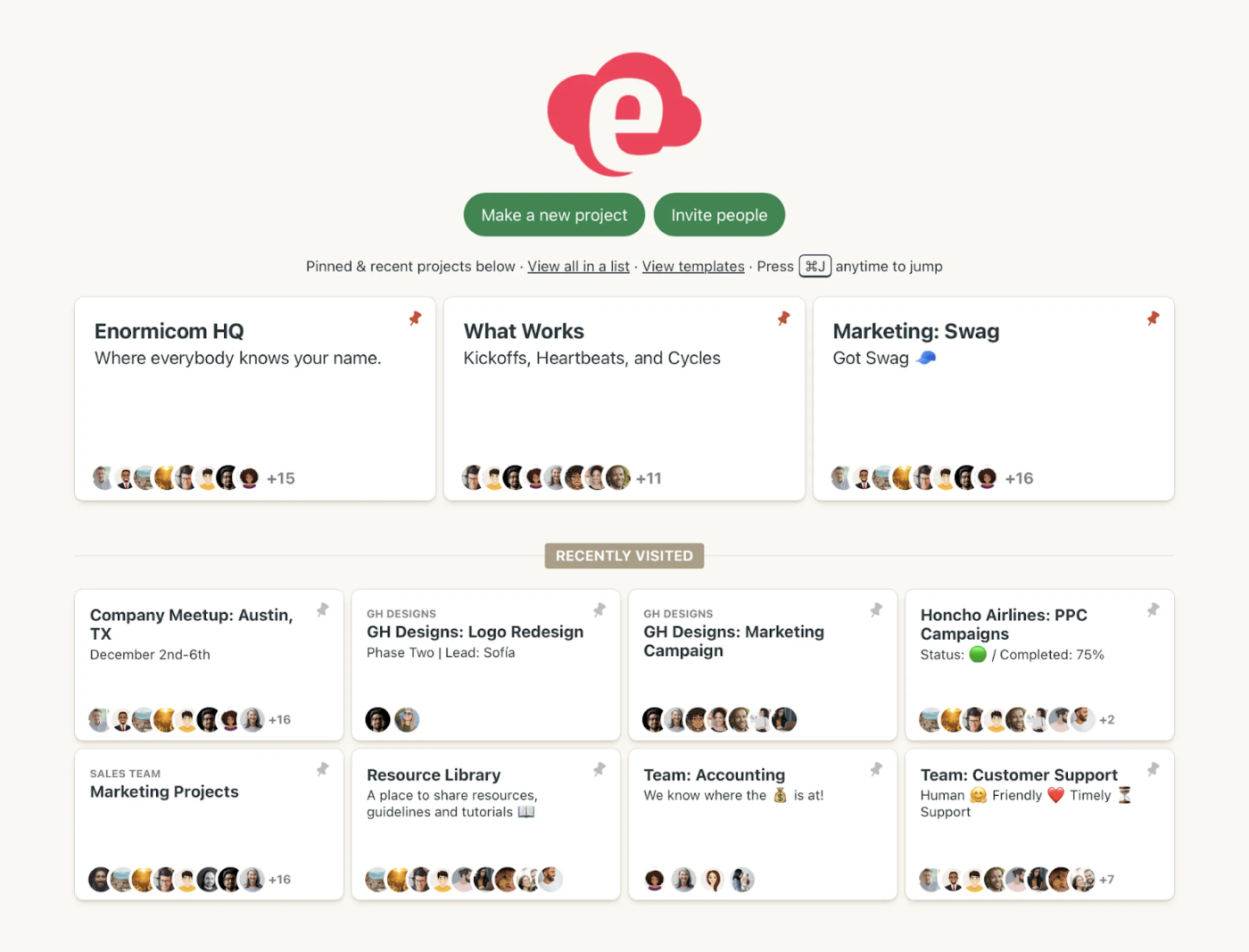
Basecamp, takımların karmaşık arayüzlerde kaybolmadan işbirliği yapabileceği, tartışabileceği ve projeleri ilerletebileceği bir alan yaratır. Bu basit araçla iletişim, proje yönetiminin merkezine yerleşir.
Basecamp ile takımlar, netlik ve anlamlı etkileşimi ön planda tutan yenilikçi bir işbirliği yaklaşımı keşfederler. Gereksiz karmaşıklığı ortadan kaldırarak en önemli konulara odaklanır.
Her proje, görevleri, son teslim tarihlerini ve etkinlikleri tek bir yerde gösteren bir ana ekrana sahiptir ve Hey! menüsü tüm bildirimleri bir arada tutar.
*basecamp'ın en iyi özellikleri
- Görevleri, mesaj panolarını, sohbetleri, dosyaları ve programları bir araya getirin, böylece hiçbir şey uygulamalar arasında dağınık kalmasın
- Sonsuz e-posta zincirlerinin yerine, belirli projeler için mesaj panoları geliştirin
- LineUp, Mission Control ve Hill Charts ile proje ilerlemesini görselleştirin
- Belge yönetimi ş Akışlarını basitleştirmek için kapsamlı proje belgeleri depoları tasarlayın
*basecamp sınırları
- Kişiselleştirilmiş bildirim ayarları gibi sınırlı özelleştirme seçenekleri
- Ayrıntılı raporlama, Gantt zaman çizelgeleri ve görev bağımlılıkları gibi gelişmiş özellikler sunmaz
*basecamp fiyatlandırması
- Ücretsiz
- Artı: Kullanıcı başına aylık 15 $
- Pro Sınırsız: Aylık 299 $ (yıllık faturalandırılır)
*basecamp puanları ve yorumları
- G2: 4. 1/5 (5.320+ yorum)
- Capterra: 4,3/5 (14.480+ yorum)
*gerçek kullanıcılar Basecamp hakkında ne diyor?
Reddit'teki bir yorumcuya göre:
Bir süre önce pazarlama takımımızın (5 kişi) projelerini yönetmek için Basecamp'e geçtik. Basitliği ve temiz arayüzü bizi ikna etti. Temel görev yönetimi ve konuşmaları izlemek için mükemmel.
Bir süre önce pazarlama takımımızın (5 kişi) projelerini yönetmek için Basecamp'e geçtik. Basitliği ve temiz arayüzü bizi ikna etti. Temel görev yönetimi ve konuşmaları izlemek için mükemmel.
10. Wrike (Kapsamlı iş yönetimine ihtiyaç duyan kurumsal işletmeler için en iyisi)
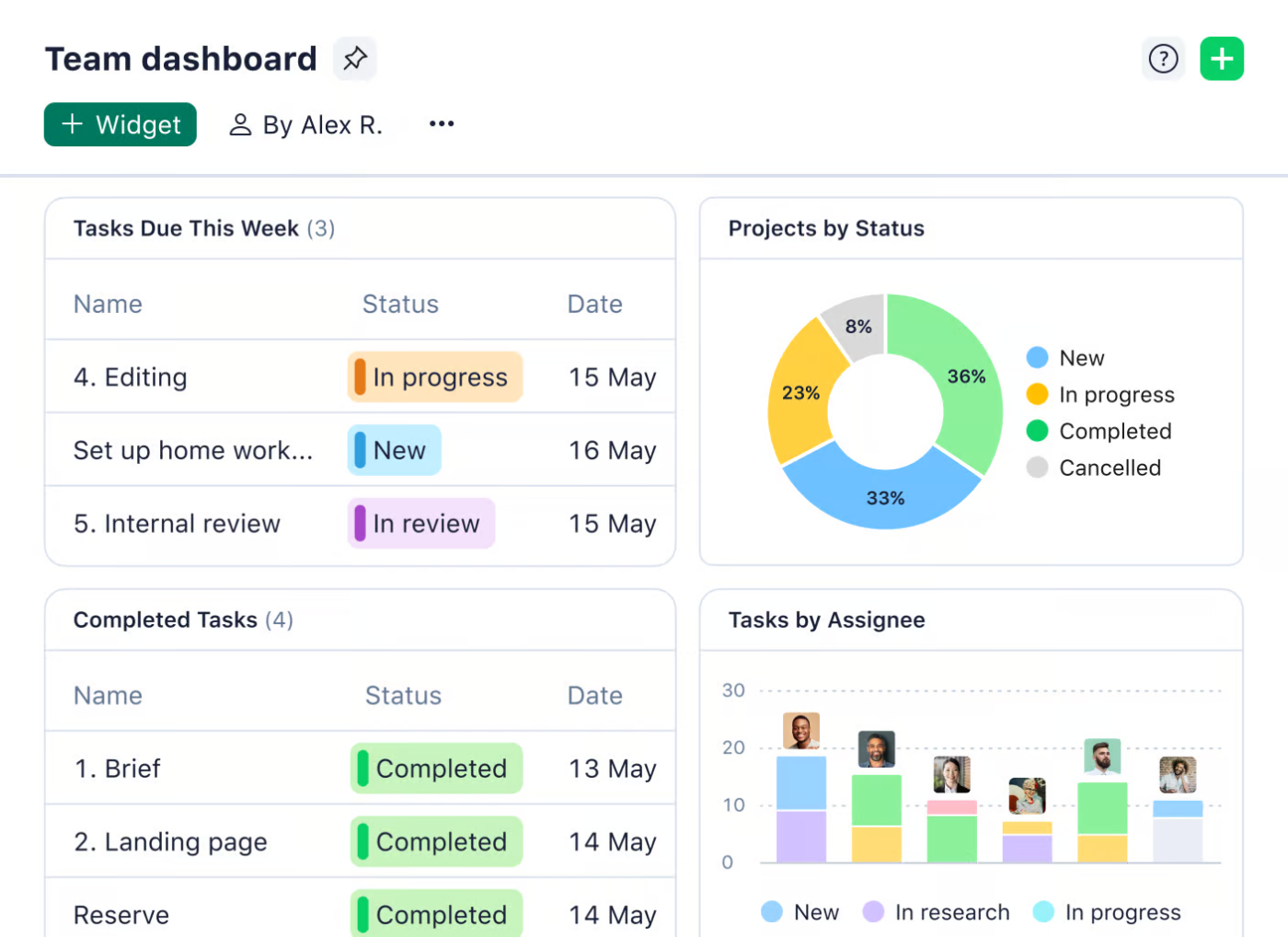
Wrike, çeşitli sektör gereksinimlerine uyum sağlayan ve farklı takım fonksiyonları arasındaki boşlukları dolduran özelleştirilebilir bir görev yönetimi yazılımıdır. Kurumsal işletmeler, Wrike'ın iş yönetimini standartlaştırma ve optimize etme yeteneğinde güçlü bir müttefik bulur.
Bu araç, yöneticilerin kimin aşırı yüklü olduğunu görmelerini ve işler sarpa sarmadan görevleri yeniden dengelemelerini sağlar. Zaman takibi ve özelleştirilebilir gösterge panelleri, projeleri durdurmamak için darboğazları veya riskleri erken ortaya çıkararak görünürlüğü bir kat daha artırır.
Gelişmiş ancak sezgisel olan bu ş Akışı otomasyon yazılımı, organizasyonel siloları ortadan kaldırır ve şeffaf, işbirliğine dayalı iş ortamları yaratır.
*wrike'ın en iyi özellikleri
- Yineleyen görevleri, projeleri ve klasörleri şablon olarak kaydedin, böylece bir dahaki sefere hızlıca kopyalayabilirsiniz
- Gelişmiş kaynak tahsisi ve iş yükü yönetimi araçlarından yararlanın
- Taslak iş notlarınızı analiz edin ve otomatik olarak alt öğelere dönüştürün
- Wrike AI'yi kullanarak olası gecikmeleri tahmin edin, risk altındaki görevleri işaretleyin ve idari işi azaltmak için otomasyonlar önerin
- Microsoft Teams, Google Çalışma Alanı ve Slack gibi çeşitli üçüncü taraf araçlarla bağlantı kurun
*wrike sınırları
- Zaman takibi yalnızca üst düzey planlarda mevcuttur ve planlama özellikleri bazı kullanıcıların ihtiyaç duyduğu kadar güçlü değildir
- Görev yönetim sisteminde kapsamlı önceliklendirme özellikleri eksiktir
*wrike fiyatlandırması
- Ücretsiz
- Takım: Kullanıcı başına aylık 10 $
- İş: Kullanıcı başına aylık 25 $
- Kurumsal: Özel fiyatlandırma
- Pinnacle: Özel fiyatlandırma
*wrike puanları ve yorumları
- G2: 4,2/5 (3.760+ yorum)
- Capterra: 4,3/5 (2.785+ yorum)
*gerçek kullanıcılar Wrike hakkında ne diyor?
İşte G2'nin incelemesi:
Wrike'ın kullanımı çok kolaydır. Yapı kurulduktan sonra, pazarlama projelerini yürütmek ve izlemek ve pazarlama takımını yönetmek için harika bir araçtır. Wrike'ın hem ücretli hem de ücretsiz sürümlerini kullandım. […] Sistemi, onu getirdiğim kuruluşlara entegre etmek kolaydı.
Wrike'ın kullanımı çok kolaydır. Yapı kurulduktan sonra, pazarlama projelerini yürütmek ve izlemek ve pazarlama takımını yönetmek için harika bir araçtır. Wrike'ın hem ücretli hem de ücretsiz sürümlerini kullandım. […] Sistemi, onu getirdiğim kuruluşlara entegre etmek kolaydı.
🧠 İlginç Bilgi: Transcontinental Railroad (1860'lar), resmi proje yönetimi tekniklerinin kullanıldığı ilk büyük altyapı projelerinden biriydi. Mühendisler, malzemeleri, hava koşullarını ve teslim tarihlerini izleme yaparak, uzak mesafelerdeki binlerce işçiyi koordine etmek zorundaydı.
11. Miro (İşbirliğine dayalı beyaz tahta deneyimi gerektiren görsel takımlar için en iyisi)
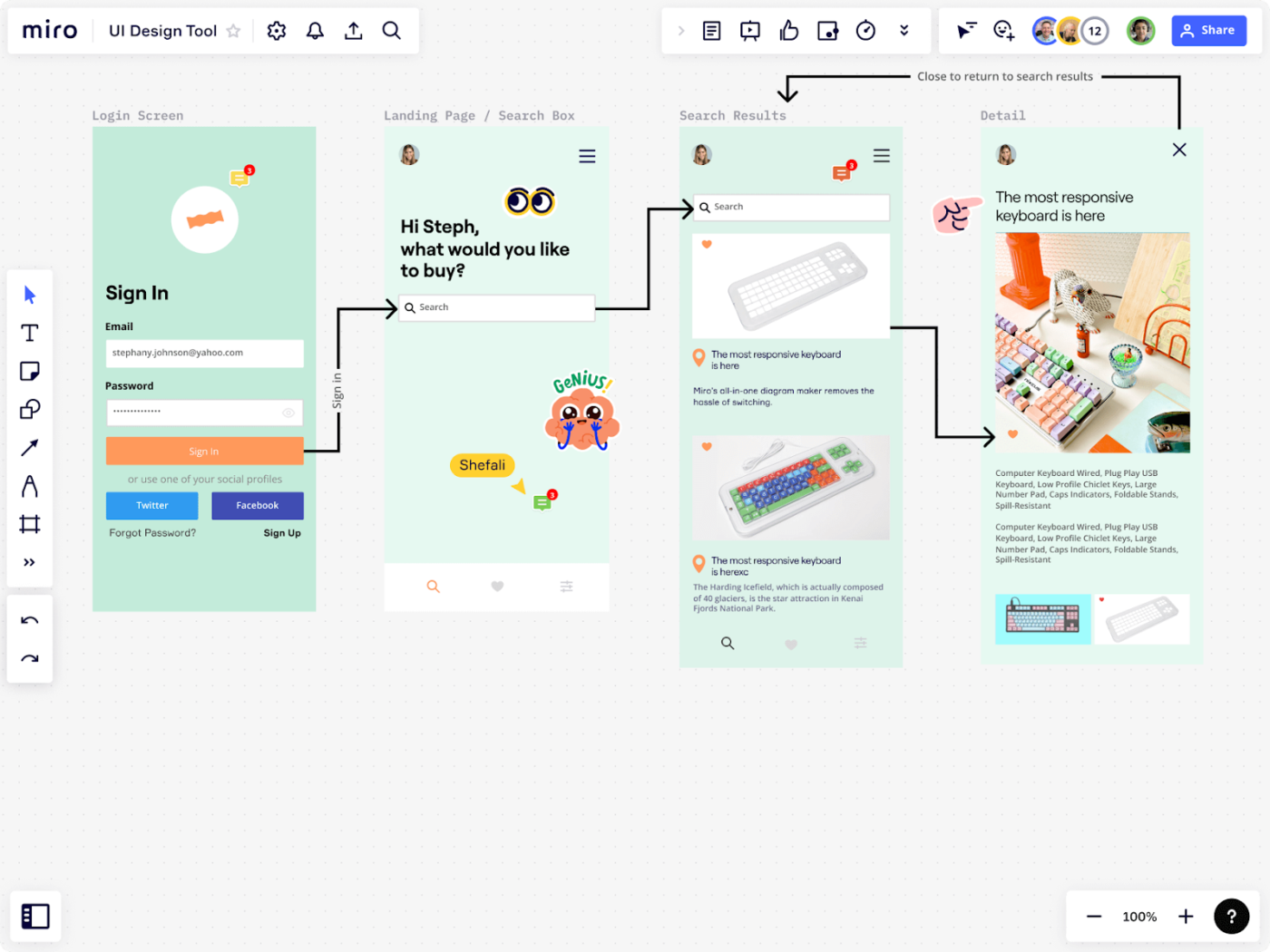
Miro, görsel olarak beyin fırtınası yapmak, planlamak ve yürütmek için sonsuz bir işbirliği ortamı sunar. Platform, uzaktaki takımların aynı odadaymış gibi etkileşim kurmalarını sağlayan dijital bir beyaz tahta görevi görür.
Takımlar fikirleri keşfederken, stratejileri harita ederken ve kavramları gerçek zamanlı olarak birbirine bağlantı kurarken görsel düşünme, güçlü bir proje yönetimi aracı haline gelir. Miro, soyut düşünceleri somut proje yol haritalarına dönüştürür.
Miro AI, işi hızlandırmak ve manuel çabayı azaltmak için tuval ile derinlemesine entegre edilmiştir. Metin komutlarından anında diyagramlar oluşturabilir, yapışkan notlarda yakalanan karmaşık tartışmaları özetleyebilir ve fikirleri anahtar kelime veya duyguya göre otomatik olarak gruplandırabilir.
Miro'nun en iyi özellikleri
- Geleneksel toplantıların yerini alacak geniş görsel işbirliği alanları oluşturun
- Birden fazla giriş yöntemi ve canlı düzenleme özelliği ile etkileşimli beyin fırtınası panoları geliştirin
- AI destekli araçlarla diyagram ve özetlerin oluşturma sürecini otomasyonla gerçekleştirin
- Karmaşık organizasyonel süreçleri harita iş akışı diyagramları tasarlayın
- Çeşitli stratejik plan ihtiyaçları için şablon kitaplıkları oluşturun
- 160'tan fazla uygulamayla entegre ederek proje bilgilerini merkezileştirin
Miro sınırları
- Müşterilere panolar sunmak zor olabilir, bazı kullanıcılar bu süreci hantal ve profesyonelce bulmuyor
- Kullanıcılar, Miro'nun mobil uygulamasından karışık deneyimler yaşadıklarını bildirmişlerdir. Bu da, uygulamanın masaüstü deneyimini tam olarak yansıtmayabileceğini göstermektedir
Miro fiyatlandırması
- Ücretsiz
- Başlangıç: Kullanıcı başına aylık 8 $
- İş: Kullanıcı başına aylık 16 $
- Kurumsal: Özel fiyatlandırma
Miro puanları ve yorumları
- G2: 4,7/5 (7.755+ yorum)
- Capterra: 4,7/5 (1.620+ yorum)
🔍 Biliyor muydunuz? 1910 yılında oluşturulan Gantt şeması, proje planlamasında devrim yarattı. Görevleri zaman içinde izleme için görsel bir yöntem sunan bu şema, günümüzde de endüstrilerde yaygın olarak kullanılmaktadır. 1930'larda Hoover Barajı'nın inşasında bile Gantt şemalarının ilk sürümleri kullanılmıştır.
verimliliğinizi ClickUp ile artırın*
İş yönetimi araçları konusunda herkesin boyutu uygun tek bir çözüm yoktur. Bazı takımlar görevleri izlemek için temiz bir yönteme ihtiyaç duyar, çoğu güçlü otomasyon ister ve bazıları ise bilgi ve işbirliğini tek bir yerde entegrasyonlarla birleştirmeye odaklanır.
İşte burada, iş için her şeyi içeren uygulama ClickUp öne çıkıyor. Esneklik için tasarlanmış güçlü bir araçtır. Sprint planlamasından Google Takvim ile entegrasyona, belgelere ve yapay zeka destekli içgörülere kadar, takımınız, topluluğunuz ve müşterilerinizle birlikte büyüyen, en iyi çalışma şeklinize uyum sağlayan bir araçtır.
Proje planlarınız, görevleriniz, raporlarınız, belgeleriniz ve takım iletişiminiz tek bir yerde entegre edildiğinde, ClickUp farklı araçlarınızın yerini alacak ve iş dağınıklığını ortadan kaldıracak birleşik bir yapay zeka çalışma alanı haline gelir.
